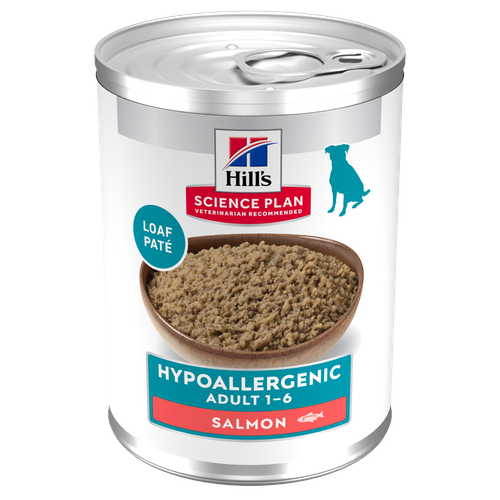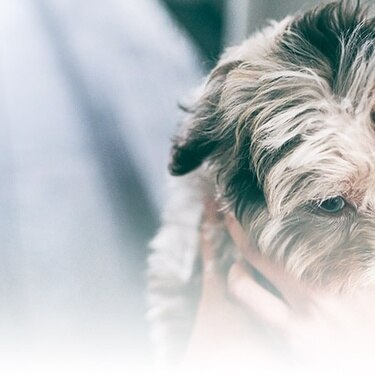
-
Find the right food for your petTake this quiz to see which food may be the best for your furry friend.Find the right food for your petTake this quiz to see which food may be the best for your furry friend.Featured products
 Adult Wet Dog Food with Beef
Adult Wet Dog Food with BeefHill's Science Plan Adult Multipack Wet Dog Food with Chicken, Beef & Turkey are complete premium pet foods for adult dogs from 1 year. Your dog will love these deliciously smooth and savoury minced loaves, formulated for balanced nutrition and overall health.
Shop Now Puppy Food
Puppy FoodHill's Science Plan Puppy Multipack Wet Dog Food with Chicken & Beef are complete premium pet foods for growing puppies from weaning until 1 year old and for pregnant and nursing dogs. Your puppy will love these deliciously smooth and savoury minced loaves, formulated for balanced nutrition and overall health.
Shop Now Mature Adult Dog Food
Mature Adult Dog FoodHill's Science Plan Mature Adult Multipack Wet Dog Food with Chicken & Beef are complete premium pet foods for mature adult dogs from 7 years. Your dog will love these deliciously smooth and savoury minced loaves, formulated to deliver the appropriate amount of energy to support the needs of adult dogs.
Shop NowFeatured products Mature Adult Wet Cat Food with Chicken
Mature Adult Wet Cat Food with Chicken
Tender chicken chunks in gravy for mature adult cats. Made with easy-to-digest ingredients, high-quality protein for lean muscle maintenance and antioxidant vitamins C+E for optimal health.
Shop Now Light Adult Multipack Wet Cat Food with Chicken & Ocean Fish
Light Adult Multipack Wet Cat Food with Chicken & Ocean FishTender chicken chunks in gravy for cats, with L-carnitine and fewer calories for ideal weight management. Packed with high-quality protein, omega-6s, and vitamin E for shiny fur and healthy skin.
Shop Now Adult Multipack Wet Cat Food with Beef, Ocean Fish & Chicken
Adult Multipack Wet Cat Food with Beef, Ocean Fish & ChickenTender chunks in gravy for cats, with high-quality protein to maintain lean muscle. With vitamin E and omega-3s & -6s for healthy skin and balanced minerals to support healthy vital organs.
Shop Now -
Dog
- Dog Tips & Articles
-
Health Category
- Weight
- Food & Environmental Sensitivities
- Urinary
- Digestive
- Joint
- Kidney
-
Life Stage
- Puppy Nutrition
- Adult Nutrition
- Senior Nutrition
Cat- Cat Tips & Articles
-
Health Category
- Weight
- Skin & Food Sensitivities
- Urinary
- Digestive
- Kidney
-
Life Stage
- Kitten Nutrition
- Adult Nutrition
Featured articles The Right Diet For Your Pet
The Right Diet For Your PetIn people, the right diet is very important. If you are eating the wrong way for your metabolism, activity level, age and lifestyle you could end up with health issues.
Read More Show some love with wet foods: a great choice for pets with health issues
Show some love with wet foods: a great choice for pets with health issuesShow some love with wet foods: a great choice for pets with health issues.
Read More The Incredible Science Behind Your Pet's Microbiome
The Incredible Science Behind Your Pet's MicrobiomeLearn what your pet's microbiome is, how it contributes to your pet's gut and overall health, and why nutrition is important in maintaining healthy microbiomes.
Read More -


Letting your puppy outside for the first time can be a little frightening for both of you. Combined with their helplessness, curiosity, and penchant for getting into mischief, your pup's small and delicate frame seems like a recipe for disaster. But being comfortable in different environments, including being outside, is an important part of a puppy's development. Follow these tips on the best time to start taking your little one outside and introducing them to the world.
Going out in the garden

When can your puppy go out in the garden? As long as your garden is securely fenced and not used by unvaccinated dogs, the PDSA says you can let your puppy start exploring the garden straight away. Take them outside for toilet breaks every 1-2 hours, as soon as they wake up, whenever they drink water, and after each meal, as they’re more likely to go to the toilet at these times which gives you the opportunity to reward them for being so clever. Visits outside should be kept short at first and, of course, your pup should be closely supervised. This is also a good time to introduce them to a collar and lead in preparation for going on walks or being taken out to public spaces.
Puppies are very vulnerable to temperature extremes. If it’s especially cold outside, minimise the time outside by focusing on the toileting and skipping the exploring. Also, remember that puppies will get cold much faster when they’re wet, so always dry them gently and thoroughly if they’ve been out in the rain. Listen to your puppy; if they don’t want to go outside, don’t force them, as this will make them distrust or fear you.
Similarly, puppies are particularly susceptible to heat-related illnesses. If you're facing hot weather, keep outside trips short, and never leave your puppy outside unsupervised on a hot day, unless they have access to shade and plenty of water.


Tasty Tips
Socialising Your Puppy
 When your puppy can safely socialise will depend on the vaccinations they’ve been given as well as the disease risk in your community. Your vet will be able to tell you what the protocol is for the brand of vaccines they use. The socialisation period only lasts until 14 weeks of age, so it is important to discuss what will be best for your pup, with your vet.
When your puppy can safely socialise will depend on the vaccinations they’ve been given as well as the disease risk in your community. Your vet will be able to tell you what the protocol is for the brand of vaccines they use. The socialisation period only lasts until 14 weeks of age, so it is important to discuss what will be best for your pup, with your vet.
Early socialisation helps your puppy get to know the world they’re going to live in. This means gradually introducing them to your family and friends, strangers, other dogs, other animals, and all the joys and excitement of the big wide world. Puppy school is an excellent start to socialising your puppy well.
If you're worried about your puppy mixing with unvaccinated dogs or being exposed to risky environments before they’ve had all their vaccinations, you can set up play dates with dogs who are vaccinated, choose low risk environments such as a friend’s garden, or simply carry your pup when taking them off your property. Don’t try to tick off every encounter straight away. Getting used to new experiences needs to be a positive experience. Forcing it when your puppy is not happy and relaxed can have the opposite effect and make them fearful or anxious in the longer term. Ask your vet, puppy school instructor, or a qualified behaviourist for advice on the best way to go about socialising your puppy safely.
There's a chance your puppy might get overstimulated and become over-excited during their first few trips outdoors. If this happens, simply take a break or call it a day and give them a chance to rest and calm down. But under no circumstances should their hyper behaviour keep you from taking them out on a regular basis. They will get used to the stimulating and distracting outdoors as they grow and develop whereas it is far more difficult to socialise an older dog who has missed opportunities for exploring and socialising during the socialisation period. Over-stimulation in a young puppy that's still becoming socialised is much less serious than over-stimulation in an older dog that hasn't been properly socialised.
Spending time outside with your puppy is also a great bonding opportunity. As they’re exploring their new world, knowing that you are there to take care of them and protect them will help form a strong bond. It will encourage them to look to you and the rest of your family when they are ready to go outside to go to the toilet or go on walks. Additionally, because puppies are still learning, this is the perfect opportunity for you to help teach them the dos and don'ts of the world.
Going outside and exploring is a major factor in raising a dog that is well-mannered and at peace with their environment. As long as you follow these guidelines, your puppy should be safe and sound as they learn how to live happily in this big, wide world.


Jean Marie Bauhaus is a pet parent, pet blogger, and novelist from Tulsa, Oklahoma, where she usually writes under the supervision of a lapful of fur babies.
Related products

Hill's Science Plan Adult Multipack Wet Dog Food with Chicken, Beef & Turkey are complete premium pet foods for adult dogs from 1 year. Your dog will love these deliciously smooth and savoury minced loaves, formulated for balanced nutrition and overall health.

Hill's Science Plan Hypoallergenic Adult Wet Dog Food with Salmon is a complete premium pet food for all adult dogs from 1 year. This savoury tinned loaf is specially formulated for dogs with delicate skin and stomachs. It features a single novel animal protein source and is grain-free.

Hill's Science Plan Mature Adult Multipack Wet Dog Food with Chicken & Beef are complete premium pet foods for mature adult dogs from 7 years. Your dog will love these deliciously smooth and savoury minced loaves, formulated to deliver the appropriate amount of energy to support the needs of adult dogs.

Hill's Science Plan Puppy Multipack Wet Dog Food with Chicken & Beef are complete premium pet foods for growing puppies from weaning until 1 year old and for pregnant and nursing dogs. Your puppy will love these deliciously smooth and savoury minced loaves, formulated for balanced nutrition and overall health.
Related articles

Learn about the potential health risks of a raw diet for dogs and why they aren't the best option for your pup or you.

Learn effective tips for feeding a dog that's a picky eater and ensure proper nutrition for a finicky eater. Discover tips for pet parents at Hill's Pet UK.

How, when and what to feed your new puppy is an important decision, learn more about the things to consider for feeding your puppy.

Many human foods are dangerous to dogs. Read about 5 of the worst toxic food offenders that can kill your dog - and how much it takes to hurt them.

Put your dog on a diet without them knowing
Our low calorie formula helps you control your dog's weight. It's packed with high-quality protein for building lean muscles, and made with purposeful ingredients for a flavourful, nutritious meal. Clinically proven antioxidants, Vitamin C+E, help promote a healthy immune system.
Put your dog on a diet without them knowing
Our low calorie formula helps you control your dog's weight. It's packed with high-quality protein for building lean muscles, and made with purposeful ingredients for a flavourful, nutritious meal. Clinically proven antioxidants, Vitamin C+E, help promote a healthy immune system.

